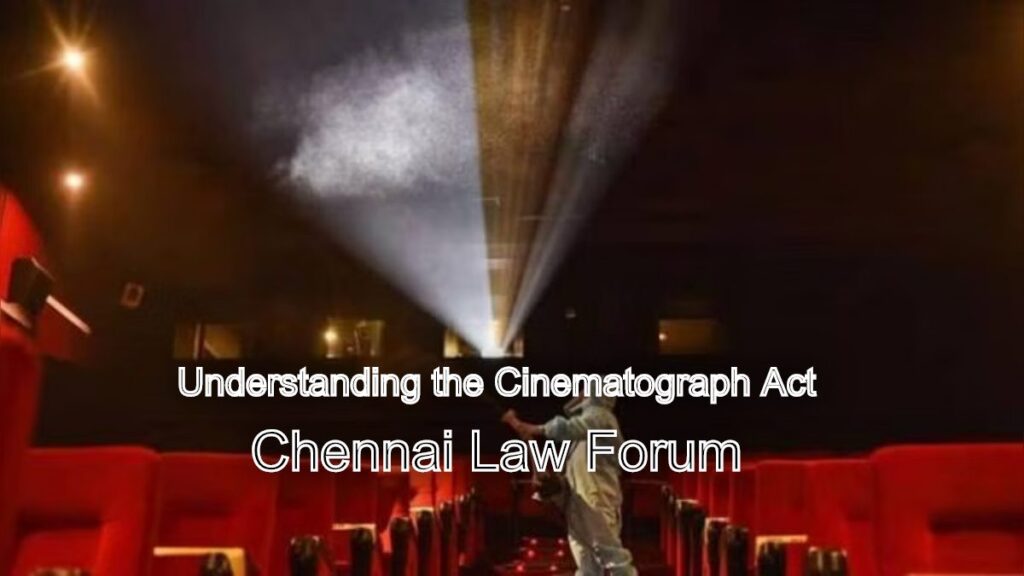Understanding the Cinematograph Act: The Cinematograph Act, a cornerstone of India’s film industry, regulates the production, exhibition, and distribution of films within the country. While the act provides a framework for the industry, its intricate provisions can be perplexing for filmmakers, distributors, and exhibitors alike. This article aims to shed light on the key aspects of the Cinematograph Act, offering insights into its implications and highlighting the expertise of the Chennai Law Forum in navigating its complexities.
Understanding the Cinematograph Act: Chennai Law Forum
Key Provisions of the Cinematograph Act
The Cinematograph Act covers a wide range of topics, including:
- Certification: The act mandates the certification of films by the Central Board of Film Certification (CBFC) before their public exhibition. The CBFC classifies films into various categories, such as U (Universal), U/A (Universal with Parental Guidance), A (Adult), and S (Special), based on their content.
- Exhibition: The act regulates the exhibition of films in theaters, ensuring compliance with licensing requirements and censorship guidelines. It also addresses issues such as film piracy and unauthorized screenings.
- Distribution: The act governs the distribution of films, including the import, export, and sale of film prints and digital files. It also provides safeguards against copyright infringement and unauthorized reproduction.
- Offenses and Penalties: The act outlines various offenses related to the violation of its provisions, such as unauthorized exhibition, piracy, and false certification. It also prescribes penalties for such offenses, including fines and imprisonment.
Challenges Faced by the Film Industry
Despite the Cinematograph Act’s purpose of regulating the film industry, it has faced several challenges over the years. Some of the key issues include:
- Censorship Controversies: The CBFC’s certification process has often been subject to controversy, with filmmakers and audiences raising concerns about excessive censorship and restrictions on creative expression.
- Technological Advancements: The rapid evolution of technology has posed challenges to the act, as it struggles to keep pace with new distribution methods and piracy techniques.
- International Collaborations: Increasing international collaborations in the film industry have necessitated the harmonization of regulations and standards.
The Role of Chennai Law Forum
In the midst of these challenges, the Chennai Law Forum has emerged as a trusted source of legal guidance for the film industry. With a team of experienced lawyers specializing in media and entertainment law, the forum offers comprehensive legal services to filmmakers, distributors, and exhibitors.
The Chennai Law Forum provides the following services:
- Legal Consultation: The forum offers expert advice on various aspects of the Cinematograph Act, including certification, exhibition, distribution, and copyright.
- Contract Negotiation: The forum assists clients in negotiating contracts related to film production, distribution, and exhibition, ensuring that their rights are protected.
- Dispute Resolution: The forum represents clients in legal disputes arising from the film industry, including copyright infringement, contract breaches, and censorship controversies.
- Regulatory Compliance: The forum helps clients navigate the complex regulatory landscape of the film industry, ensuring compliance with the Cinematograph Act and other relevant laws.
Frequently Asked Questions (FAQs)
1. What is the role of the Central Board of Film Certification (CBFC)?
The CBFC is responsible for certifying films before their public exhibition, classifying them into different categories based on their content.
2. Can a film be released without CBFC certification?
No, a film cannot be publicly exhibited in India without obtaining a certificate from the CBFC.
3. What are the penalties for violating the Cinematograph Act?
Penalties for violating the Cinematograph Act include fines and imprisonment, depending on the nature of the offense.
4. Can the CBFC censor a film’s content?
Yes, the CBFC has the power to censor certain content in films if it deems it necessary to protect public morality or national security.
5. How can the Chennai Law Forum assist filmmakers?
The Chennai Law Forum can provide legal advice, contract negotiation, dispute resolution, and regulatory compliance services to filmmakers.
Conclusion
The Cinematograph Act plays a vital role in shaping the Indian film industry. While it provides a framework for the production, exhibition, and distribution of films, its intricacies can be daunting for those involved in the industry. The Chennai Law Forum, with its deep understanding of media and entertainment law, offers invaluable support to filmmakers, distributors. Exhibitors, helping them navigate the challenges and complexities of the Cinematograph Act.
Read More
- Fighting Chit Fund Fraud: Legal Support from Chennai Law Forum
- Protecting Child Rights: Legal Advocacy from Chennai Law Forum
- Child Custody Legal Services: Protecting Parental Rights
- Legal Services for Child Adoption: Chennai Law Forum Expertise
- Seeking Justice for Cheque Dishonour: Legal Assistance in Chennai
- Ministry of Information and Broadcasting

